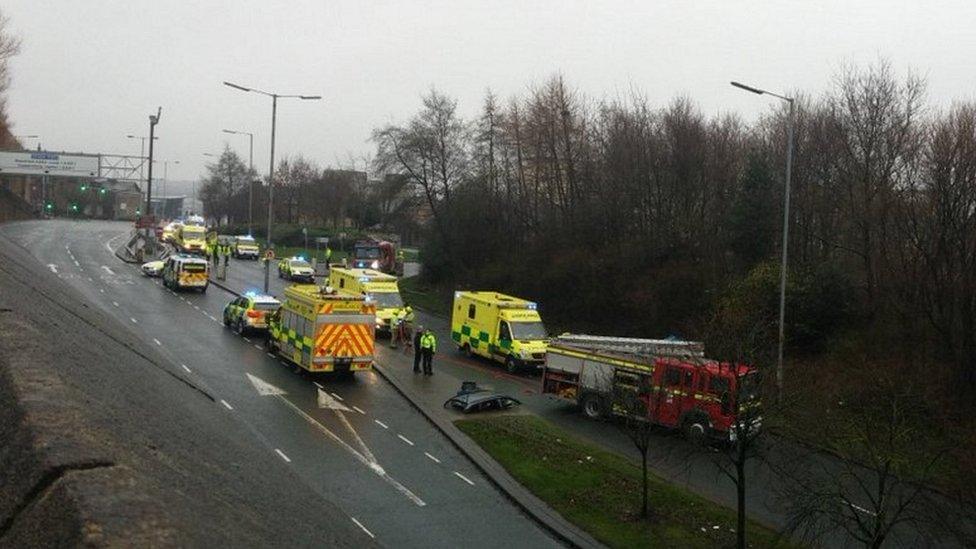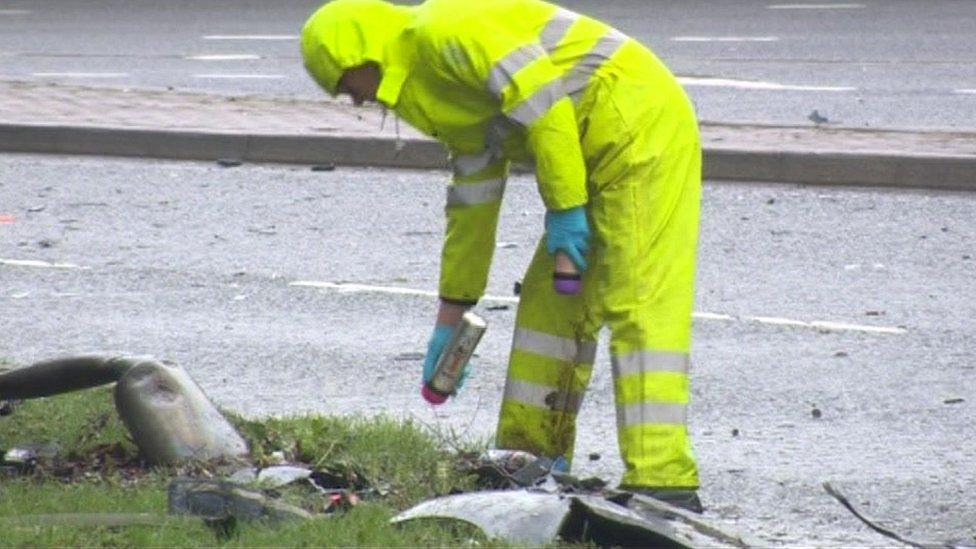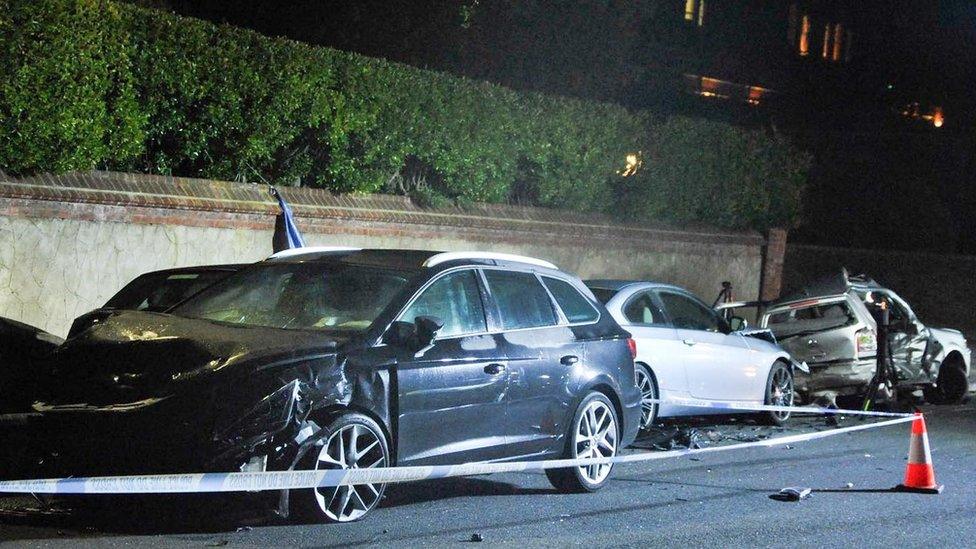Is the law tough enough on killer drivers?
- Published

A taxi driver and his passenger were killed by two drivers racing each other in Bradford in January
Two young men have been jailed for a high-speed car crash that killed a taxi driver and his passenger - the latest in a series of similar cases in England. Are the penalties for such drivers sufficient? Even the judge, sentencing them to seven-and-a-half years apiece, admitted the length of the prison terms "will no doubt be questioned".
Judge Jonathan Durham Hall said he was obliged to give the pair credit for their guilty pleas - despite his view that the case was "approaching the worst" of its kind.
Muhammad Sikder, 27, and Ismail Miah, 23, were racing each other in their high-performance cars when they caused the fatal crash in Bradford in January.
The maximum possible jail sentence for causing death by dangerous driving is 14 years, while causing death by careless driving carries a maximum penalty of five years in prison.
But road safety charity Brake says the average prison sentence handed out to those convicted of killing someone while driving is under four years.

Bradford Crown Court heard a BMW 3 Series and a Range Rover Sport smashed into a Proton private hire car, killing taxi driver Mirza Malick and his passenger Paul Hayward
"In 30 years, the longest sentence I saw handed out was six," said John Scruby, a former traffic officer.
Mr Scruby, now a trustee for the West Yorkshire road charity SCARD, added: "It's appalling how families are treated.
"As a family liaison officer, I had to tell them, 'don't get your hopes up for a custodial sentence' as some cases aren't even passed up to the crown court.
"Judges are obviously tied by what they can do, but they are very reluctant to hand out the maximum sentence."

Causing death by careless driving
Maximum sentence of five years in jail
201 people charged in 2015
It is classed as driving that falls below what is expected of a careful and competent driver
Causing death by dangerous driving
Maximum sentence of 14 years in jail
188 people charged in 2015
It is classed as driving that falls well below what is expected of a careful and competent driver
Source: Brake

James Gilbey was killed on a pedestrian crossing in Leeds last year, with his body struck at such speed it travelled 70m down the road.
Majid Malik and Kaiz Mahmood, who were racing in separate cars at the time of the crash, both received sentences of eight years for causing death by dangerous driving.

James Gilbey was killed while crossing Stanningley Bypass in Leeds on 13 July 2015
Speaking to BBC Radio 4's Today, Mr Gilbey's father Maj Richard Gilbey said: "They have got a huge reduction from the maximum sentence and you don't feel it's enough.
"They didn't choose to kill James, but all of their actions were conscious actions and decisions - they chose to drive at 90mph, they chose to race, leave James and burn their clothes [to destroy evidence].
"All of those things tied together can't be a driving-related incident, it's manslaughter at the very least."
At a Westminster Hall debate on the issue earlier this week, Claire Perry MP called on the government to introduce tougher penalties for motorists convicted of causing death by dangerous driving.
The Conservative MP for Devizes said: "These gentleman killed James Gilbey as surely as if they had thrown a knife down a crowded street or fired a gun.
"Their weapon of choice just happened to be two tonnes of steel driving at 90mph.
"Surely the maximum tariff for the worst kind of death by dangerous driving, which these defendants committed, should be lifetime imprisonment."

Majid Malik (left) and Kaiz Mahmood were using Stanningley Bypass as a race track in which they were racing in separate cars
Justice minister Sam Gyimah said the Sentencing Council - an independent body that aims to promote consistency in sentencing in England and Wales - was reviewing guidelines relating to such driving offences with new draft guidance to be set out "in due course".
He said: "As the prime minister made clear last week there are deep concerns around the law on dangerous driving and the sentencing powers that are currently available to the courts.
"For too long these concerns have not been acted upon."
Mr Gyimah reaffirmed the government's commitment to consult on the penalties for dangerous driving offences and insisted ministers want to make sure that the punishments "fit the crime".
However, Dominic Grieve, the former attorney general, said he thought the offence of causing death by dangerous driving was "treated very seriously" and did provide "the adequate punishment".
He said: "There is nothing to suggest that manslaughter charges would lead to higher sentences.
"I can see there might be arguments about a review of maximum sentences, but it has already been raised - it's now up to 14 years.
"One also has to keep a sense of proportion with other offences."
But for Maj Gilbey, the current laws simply do not reflect the seriousness of some drivers' actions.
"Just because their weapon of choice was a vehicle, why does it have to be downgraded to a driving-related offence?"
- Published8 September 2016

- Published25 March 2016
